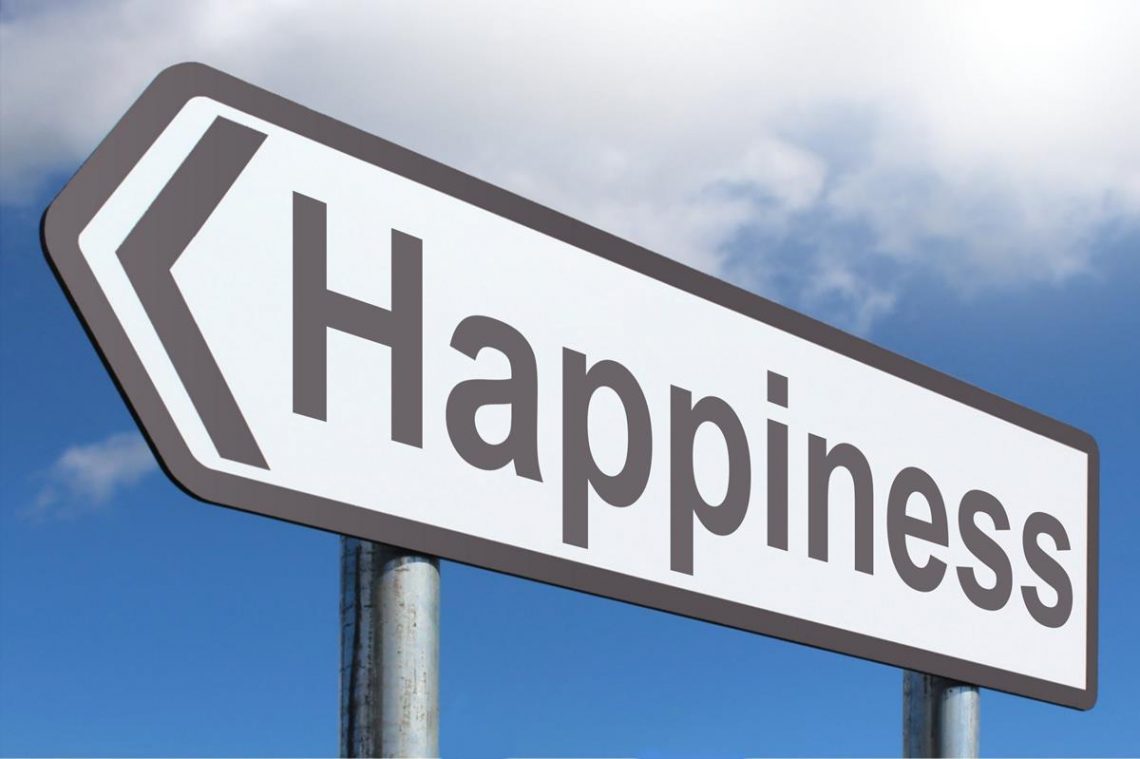
Is An Emotion an Attainable Goal?
This is reposted from my Medium stories.
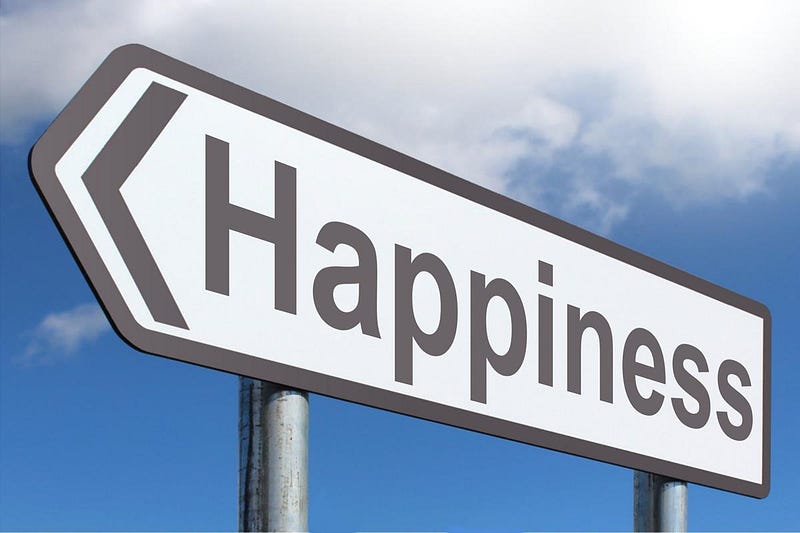
“If happiness is what I want, if happiness is something that I would want to feel more of in my life, how do I achieve that?” — actor Chris Sullivan
I listen to a lot of podcasts, usually while walking my dog. Sometimes I stop, rewind and listen. Occasionally, I listen to a particular section several times.
Sometimes it’s just one statement- one nugget.
A conversation between Chris Sullivan and Michael Rosenbaum on Rosenbaum’s podcast, Inside of You, recently made me pay attention.
Stop. Rewind. Relisten. (Which is different than stop, collaborate and listen.)
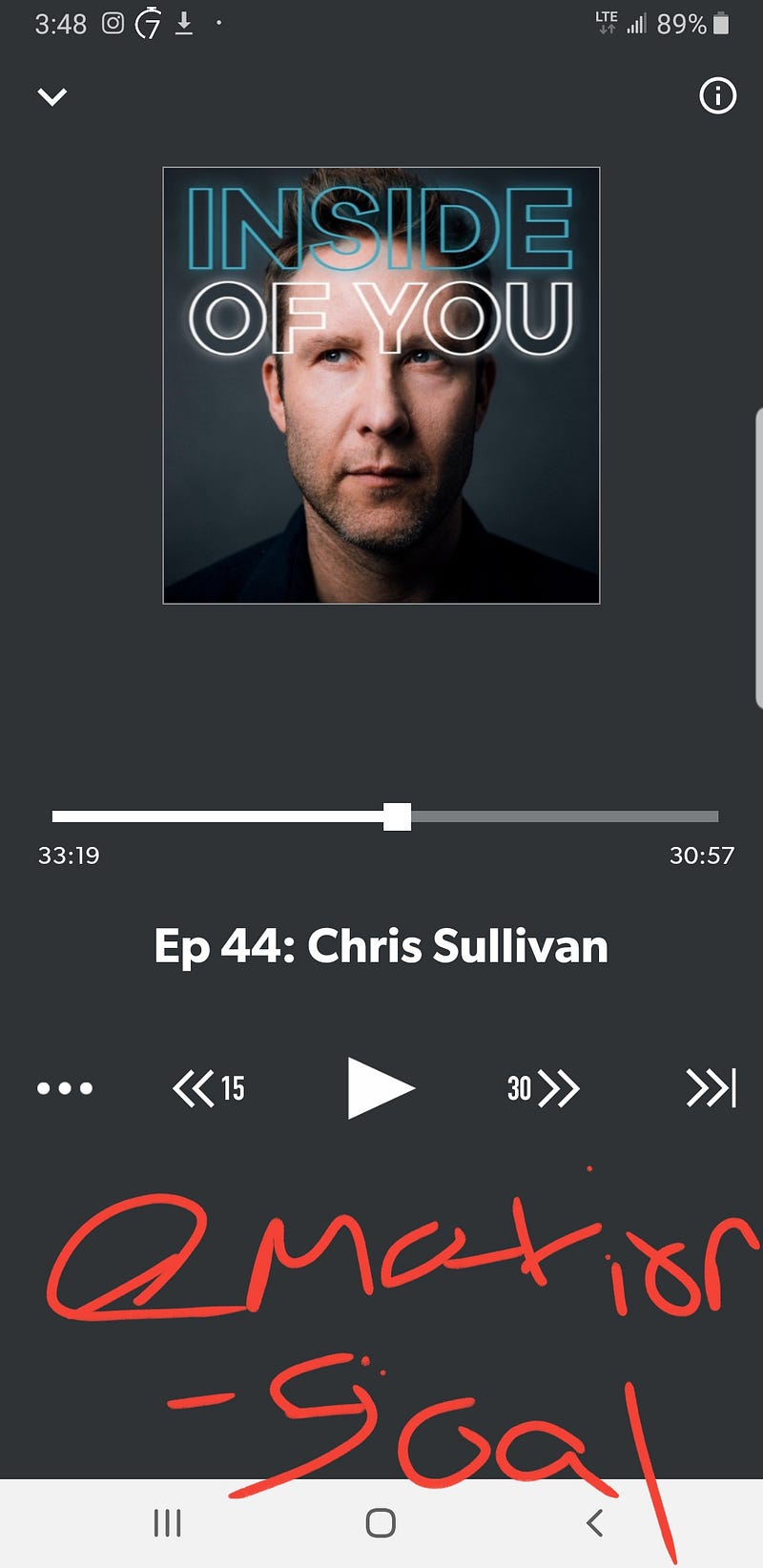
Emotion-Goal
Sullivan’s thoughts were ones I’d never considered before but made sense to me.
Is “happiness” — or any other emotion — an attainable goal?
Said Sullivan,
One of the other things my wife and I were talking about — this article that we were reading kind of put it perfectly — is that that happiness is not the goal, usefulness is the goal.
I suspect that I’m not the first person on the internet to share thoughts about this. Happiness is a popular theme. To my recollection, this podcast is the first time that I’d heard the idea that usefulness, not happiness, is the goal.
These are just my thoughts. You can disagree. Also, it might need some more editing.
…how many people have we heard in interviews, or when you talk to them, [and ask] “What do you want in life?” [And they answer] “I just want to be happy.”
But, happiness is not a goal. An emotion is not a goal. You cannot set an emotional state as a goal because emotional states are not constant. They’re constantly coming and going.
This is just what I believe to be true for myself.
So how do I achieve it? If happiness is what I want, if happiness is something that I would want to feel more of in my life, how do I achieve that?”
Which is the question nobody asks.
[Emphasis mine.]
And this is a question that I love. “How do I achieve that?”
How is it that some people seem to be happiest while miserable? What makes us happy? What do we do to achieve that state? The answer will be different for each person.
Honestly, I might have said, “I want to be happy” in the past because of societal indoctrination. Now I realize that there’s more to it. Not that I’m not happy, but am I always happy? Not at all.
Host Rosenbaum responded to Sullivan’s comments with,
Okay, well, how do you do that? Being of service to the people that I love, being of service to the people around me, being useful, being kind, being generous, being empathetic, being compassionate, trying to do one good deed every day.
-All those things, yes.
And I agree with all of this because I need to feel useful. As the saying goes, though, your mileage may vary. Maybe you achieve happiness in a way I don’t.
Usefulness is fulfilling. Fulfillment is happiness.
I get sad when my offer of help is declined. I’ve gotten angry at my boyfriend for refusing my help and I’ve told him that when I don’t feel of use, a part of me feels dead. It might sound dramatic, but it is sometimes true.
Helping people lights me up. I’ve often said that I see my role in life as that of “helper”. I don’t have one passion in life at which I’ve worked hard to achieve success (e.g. becoming a lawyer or actor), and that bothers me sometimes.

How This Has Affected My Work Life
Uselessness really has always been my goal. It makes me happy. It’s one of the things I like about contract work. I’ve often said that I like to swoop in, do the work, and leave the place better than I found it. When I work on teams where I don’t feel valued because I wasn’t allowed to do my job to the best of my ability and make things better, it’s been soul-sucking.
When I was performing tasks that metrics told me were a waste of time (hello, LinkedIn pages that people weren’t engaging with and that weren’t gaining followers), that was soul-sucking. I was being useful in that I was doing what I was tasked to do, but it wasn’t time well spent.
I can be doing something that I hate and yet enjoy the end goal of helping and being productive. Not every task needs to be enjoyable in the process but having an end goal always helps. I’ve been asked in job interviews how I approach tasks that I don’t enjoy and I’ve answered that I generally find a way to enjoy them. When I was young and getting reference letters, they often stated that I cheerfully accept tasks.
I don’t need to feel of use every moment, but overall, I need to feel needed. This can get tricky in a relationship.
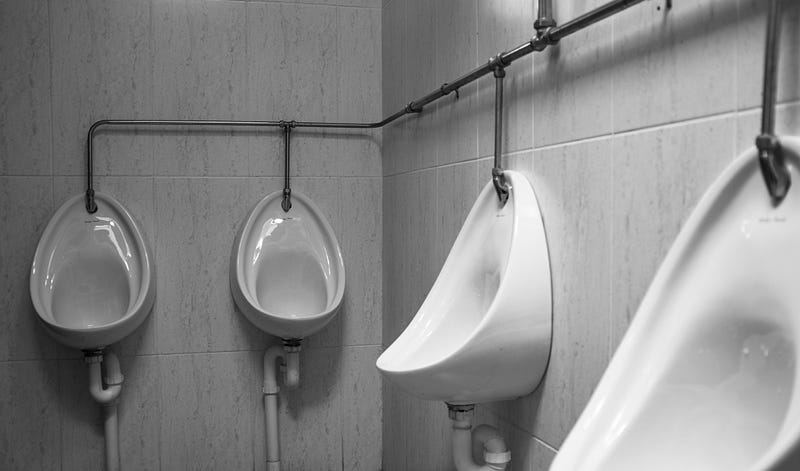
…And my family business
In my current relationship, it affects the family business because we have to do both the fun work and the shit work. I clean toilets, mop floors, serve food and drinks and, as of recently, do bookkeeping.
Once, while doing a certain cleaning task at our restaurant, I thought, “Don’t we pay people to this?” and then immediately remembered, “Oh yeah, that’s me.” That’s the only time I ever questioned it.
I never thought that I’d do bookkeeping but here I am, helping my partner in ways I never wanted to, cursing him & the many, many paper receipts repeatedly. When the project is over I will feel fulfilled. Every time I finish part of it I feel accomplished. That’s fulfilling. I feel useful. While I dislike the task and it in itself doesn’t make me “happy”, I can focus on the feeling of usefulness — and the fact that this needs to get done — as motivation.
Overall with our family business, I feel a sense of accomplishment. The place is his to run — I’m looking for a full-time job — but I’m happy to help and feel useful.
Happy to help.
Usefulness Through Writing
My writing is an attempt to be useful. I’m not getting paid for any of this, but it’s fulfilling. It’s creatively fulfilling, but there’s this part of me that thinks that if someone else’s writing is meaningful to me in some way; if I identify with something that someone wrote, others will experience that while reading my writing.
I love writing. It fills me up. Sometimes the idea of starting is daunting (I have several pieces of work in my head right now) but I love letting the words and ideas flow from brain to fingers to screen.
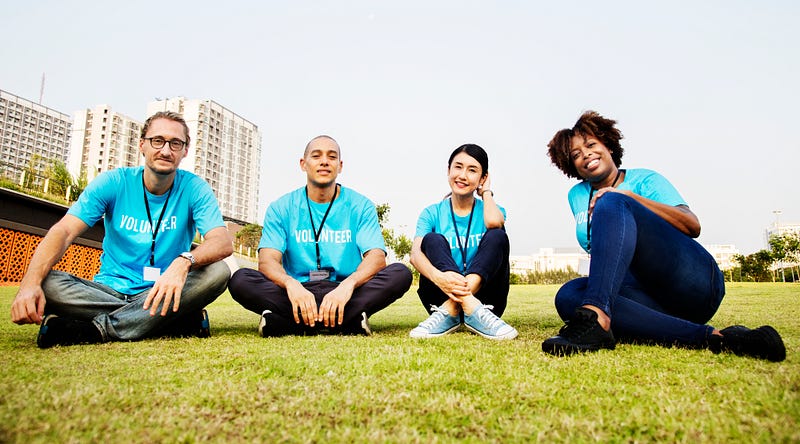
Give for the sake of giving, or give for the sake of making someone else feel good?
Sullivan, Rosenbaum and Rosenbaum’s producer Rob had a brief debate about whether it’s better to do something nice for someone because it makes you feel good or because it makes them feel good. The discussion was, is it okay to be useful if you’re doing it to feel happy (i.e., for your own gain)?
An example that Rob used to illustrate the point that it’s okay to use giving to feel better: Even Kristen Bell gets self-esteem by helping others through her charity work (Rob is also a producer on Dax Shepard’s podcast, Dax and Kristen are married to each other). Sullivan responds that in this case, everybody’s winning.
I agree.
I also want to note that Bell has openly discussed her depression and use of antidepressants, so charity and altruism as a way to boost self-esteem might also bea form of depression therapy. Happiness is not the goal, usefulness is.
“Now,” said Sullivan, “if you’re doing good deeds expecting something back from that person then maybe it’s a dangerous path.”
Love for the sake of being loved, or love for the sake of loving? And does it matter?
It reminds of this quote:
To love for the sake of being loved is human, to love for the sake of loving is angelic.
I interpret that quote as a distinction between ego and love. Ego isn’t a bad thing; it’s an essential aspect of our selves.
However, to help someone, to express love to someone, and to see what it brings to them — that’s magical.
Think Christmas morning. Doesn’t it feel amazing to see others open your gifts, and see the look on their face?
Sure, it’s selfish, but that’s not a bad thing. I think that as a society we judge the word “selfish” negatively. “Selfish” gets used as an accusation and a form of manipulation. People are selfish for many reasons, many of which are good.
The balance of ‘selfless’ and ‘selfish.’
We don’t need to be selfless to be good human beings.
We need to balance selflessness and selfishness, as both are essential qualities.
Too much giving drains our energy. Being around people who consistently take sucks our power. The reason that a lot of people burn out is that they live in the caretaker role without taking care of themselves or having people take care of them.
We need to take care of ourselves in order to be of service to others.
We need to protect ourselves.
Giving is an energy exchange
I believe that giving and receiving is an energy exchange. We give. We’re of service. We’re useful to others. It comes back to us in a positive way. THAT is what makes us happy. Even if we don’t get the immediate feedback, the idea of it can boost our esteem.
Now, I want to make a few distinctions:
Giving For the Sake of Acknowledgement
First of all, giving for the sake of making someone feel good is not the same as giving for the purpose of acknowledgment. The latter begins with the ego.
Giving for the sake of acknowledgement can also be manipulative and selfish in a manner that can be harmful to ourselves and our relationships.
When I was searching for photos to illustrate “charity” above, a few images in the series showed those volunteers taking selfies. I deliberately chose not to use one of those because it seemed opposite to what I’m trying to convey.

Are they documenting their activities for their Facebook Memories, is it for the organization’s PR material or are they saying, “Hey, look at us and the good we’re doing!”? Not that it matters. It is what you- as a reader, and me — as a creator want it to be. It’s open to interpretation.
Giving for the sake of acknowledgment is initiated in the dark part of ourselves that seeks to fill a void, that seeks love and approval. That will only work for so long. Some people are approval junkies, and that’s not sustainable because the approval will never be enough. People need to look within.
As Rosenbaum suggested, the following is altruism: Usefulness by saying, “Hey, ‘how can I help someone else today? How can I be in usefulness [sic] to them? How can I facilitate their happiness?’ or, ‘What do you need? What are you in need of?’”
Giving To Get Love in Return
Secondly, giving (or loving) for the sake of being loved is another distinction.
Giving to get love doesn’t have to be a bad thing, but in its negative expression, it reminds me of women who get pregnant because they feel the desire for someone to love them unconditionally or who get pregnant because they think it’s the only way to keep their partner. Those are examples of the desire to fill a void.
Giving IS a form of love.
The more we give, the more we receive. Remember, giving is an energy exchange. Giving makes us feel good.
Giving To Be Liked
Thirdly, A similar idea to giving for the sake of acknowledgment is giving for the purpose of validation. Validation isn’t wrong, but it’s a more superficial route to happiness. The feeling of being validated is a shallow form of happiness.
As happiness isn’t a constant state, neither is the feeling of validation. Some people will like you, some won’t. You’ll please some people but not others. Stop caring so much about validation and approval, except for when it matters.
Do your best work. Be the best person you can be.
Put in the context of building relationships: I want this person to like me, so I’m going to keep doing nice things for them.
This often ends up one-sided with the other person taking but giving nothing in return, whether it’s children in the schoolyard who want the approval of their peers, co-workers in a similar situation, an employee who craves their manager’s acceptance, or boyfriends/girlfriends/spouses, etc. One-sided isn’t always bad, but you’ll know. You’ll feel it. Refer back to my “approval junkie” comment above.
A Problem With the Concept of Usefulness For Happiness
That’s a problem with usefulness being a route to happiness: It’s possible that you’ll never be happy because the usefulness fills a need that won’t be filled unless other aspects are in balance. I suspect that giving from a place of love is key.
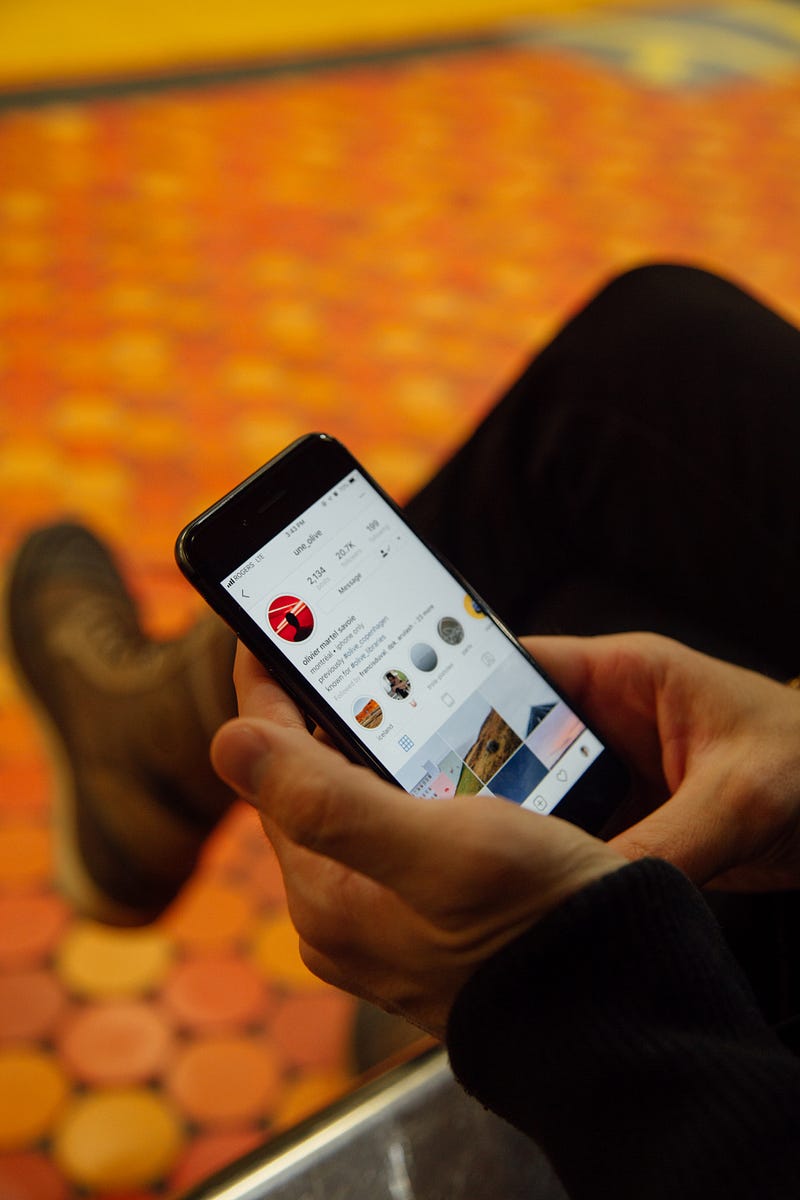
You won’t knock every project or every action out of the park.
Vanity metrics
A related example is this: Posting words or a picture to the internet to be “useful” while obsessing over the number of likes and comments can be destructive. Likes and comments are referred to as “vanity metrics”.
I’m writing this hoping that people find it and that it is meaningful to them. It’s why I keep posting to Medium. However, I’m not concerned with the number of claps or comments that it receives.
When I send out a newsletter on behalf of my restaurant or post to one of our social media accounts and then a customer comes in and says that my action is how they learned about an offering, this is both validating AND makes me feel useful.
- When my marketing activities get positive customer feedback, it validatesthat my actions worked but it also, to a small degree, makes me feel validated. It feels good.
So, that feedback is validation partly on an ego level and also on a business level. There’s no point in continuing what doesn’t work. When I’m validated on both a professional and a personal level, I’m happy. That helps my self-esteem.
- It makes me happy that what I shared was of use to them, they came in, got a great meal and service, and that made them happy. And if they then give us a 5-star review? The happiness (and validation) is back to me. And then others learn about it from word-of-mouth and those 5-star reviews and it all perpetuates itself.
Relying on other people to make you happy isn’t sustainable.
Acedia
I had never heard the word “acedia” until Sullivan defined it. He explained it this way:
It’s frequently mislabeled as ‘depression’, but it’s this feeling of worthlessness and that the world is a terrible place, and that eats away at me — or that eats away at a lot of people. And I believe that all these years, when I believed that I was depressed… it was this idea of negative self-talk. It’s negative self-thinking. It’s low self-esteem. It’s a lot of things rolled up in one, but it seems to be … ah, laziness, we’ll just call it ‘laziness’. We’ll call it ‘sloth’.
And that type of thinking is something that we have to fight inside us because we all have it inside us. You look around at everything in the world and if you look around long enough and you’re not depressed by what you see, I don’t know anyone who, especially now, is able to process everything that’s happening in the world without ending up a little down.
The misdiagnosing/mislabelling of “depression” is something I want to explore in a different post, either here or on one of my self-hosted blogs.
Your turn
Tell me your thoughts about whether or not happiness is an attainable goal. What do you think about all this?
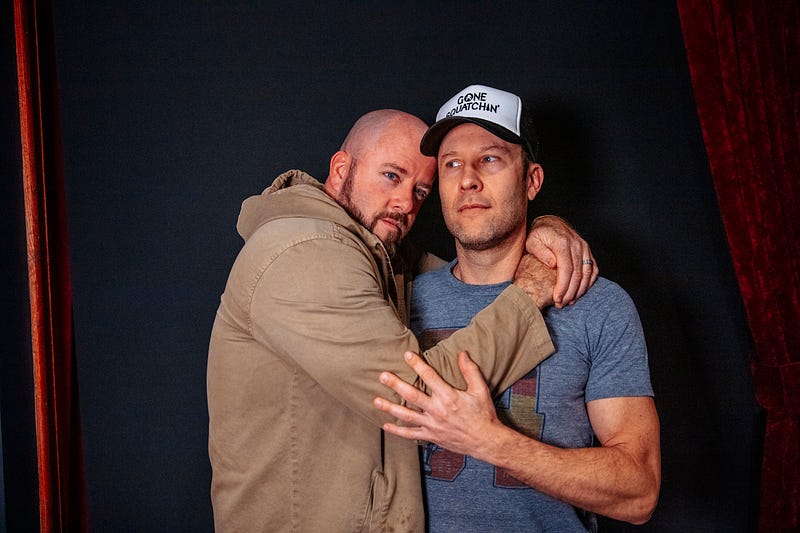
Related posts
- On Discomfort, Again — Inspired by Howie Mandel on Marc Maron’s WTF!podcast)
- My Facebook Semi-Retirement — Inspired by one of Maron’s podcast monologues.
- Anyone Can Change a Life — Another one inspired by WTF, I posted this to one of my self-hosted blogs, but not here. I’d honestly forgotten about it until I looked a folder called “writing prompts & inspiration” that I keep in my Google Drive. (I also have a spreadsheet.)
You May Also Like

Today’s Lesson: Ask For, and Listen To, Feedback
February 28, 2019
Born on a Leap Year: What Not to Say to Me
March 2, 2019

